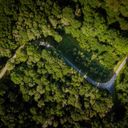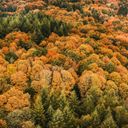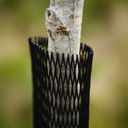
Make a long-term commitment to biodiversity and forests
It is possible to preserve biodiversity in forests and fight climate change.



Discover all the forests we manage sustainably: our forestry actions, our biodiversity projects and the trees you can buy there.
Uneven-aged forest management
We combine trees of different ages to promote biodiversity and avoid clear-cutting at the end of their life cycle.
Unlike logging activities based on clear-cutting, which are responsible for the loss of just under 1 million ha of forest each year, an area nearly four times the size of Luxembourg, uneven-aged forest management helps maintain ecosystem stability. The production of timber is possible through this continuous cover forest management, which preserves the soil as well as the diversity of animal and plant species. There is no abrupt forest intervention in this way. This approach can also increase carbon storage by up to 37% compared to unmanaged forests over a 50-year period, providing a sustainable alternative to more destructive traditional practices, such as clear-cutting.

Mixed species
We avoid monoculture forests. Instead, we plant a variety of species to improve the natural resilience of our forests.
All of our forestry plans are mapped out with a principal species in mind (the target species), one or two secondary species, and accompanying species to add diversity. This system promotes the health of the ecosystems in our forests. Recent research has shown that mixed forests can store up to 70% more above-ground carbon than the average monoculture, and 77% more than commercial forests that are grown for fast, high-volume timber production. Moreover, a large-scale analysis of over 90,000 forest areas in Europe found that mixed-species forests are 35% more resilient to storms, pests, diseases and the overall stresses of climate change compared to single-species forests.

No chemicals
We never use any pesticides in our forests. A natural repellent and temporary fencing protects saplings. Trico (the natural repellent we treat our saplings with) is made from sheep fat, which naturally repels ungulates, or hoofed animals — the saplings' main predators. In places where grazing is a more prevalent issue, fencing is installed around the saplings until they have matured. This pesticide-free approach is crucial, as pesticides in Europe have been linked to serious environmental impacts, including contamination of over 13,000 km of rivers and over 80% of agricultural soils. Pesticides contribute to biodiversity loss, harming pollinators like bees and butterflies, degrading soil health, and disrupting the balance of entire ecosystems. Avoiding their use helps protect not just the forest species but also the wider landscape’s long-term ecological resilience.

Preserving ecosystems
Nearly 60% of global GDP is threatened by nature’s decline, yet biodiversity receives eight times less media attention than climate change. Our ecologists conduct inventories to determine which species need to be protected and which measures to implement. We monitor the progress of our actions over time. We conduct an Index for Biodiversity (IBP), an inventory report for biodiversity in all of our forests when possible to determine their optimal biodiversity conditions. After a few years, a follow-up inventory tells us if the biodiversity of that forest has been enriched. Each biodiversity project is supported by clear KPIs, monitored over time, and aligned with frameworks such as TNFD (Taskforce on Nature-related Financial Disclosures) and SBTN (Science-based Targets for Nature). This allows our partner companies to responsibly report on their impact and contributions to biodiversity.

1.2 million trees sustainably managed
225 beehives installed
Social impact in forest communities